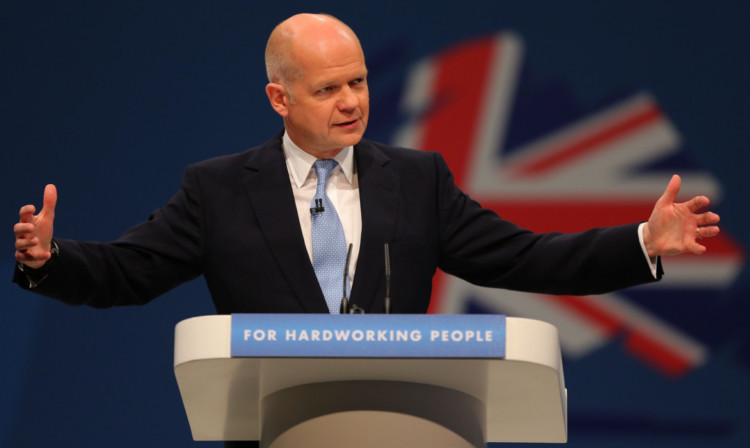Scotland faces “a more immediately uncertain world” if it votes for independence than if it votes no and risks leaving the European Union in the Conservatives’ promised referendum, Foreign Secretary William Hague has said.
The Tories’ pledge to reform the EU and then hold an in/out vote in 2017 is “the positive way to look at the future of the EU”, while Scottish independence would mean immediate ejection and lengthy re-entry negotiations for a “pay more get less” deal, the Conservative MP said.
Mr Hague is in Glasgow to launch the latest in a series of UK Government Scotland Analysis papers, with the focus on the European Union (EU) and international issues.
He said he is here “to spell out the facts” on independence and then leave it to the leaders of the Yes and No campaigns to debate them.
He rejected First Minister Alex Salmond’s demand for a public debate with the Prime Minister, insisting that David Cameron “makes clear what he thinks” but ultimately it is for Scots to debate and decide.
“It’s not Scotland against England, it’s Scots making their own decisions here,” he told BBC Radio Scotland’s Good Morning Scotland programme.
“The Prime Minister also makes clear what he thinks but the debates in referendum campaigns are between the leaders of the Yes and No campaigns, and those campaigns are in Scotland so it is for Scots to decide.
“I am here as Foreign Secretary for the whole of the UK to spell out the facts, as it is my responsibility to do that.”
Polls indicate that support for the EU is marginally higher in Scotland than elsewhere in the UK, but with a tenth of the UK population Scots risk being outvoted if they vote no to independence in 2014 and yes to stay in the EU in 2017.
Mr Hague said: “I think its a more dramatically and immediately uncertain world if Scotland were to vote to separate itself from the UK this coming year.
“What we are trying to achieve by 2017 is a reformed EU that we can recommend the whole of the UK stays in.
“Scotland needs a reformed EU as well. Now this is the positive way to look at the future of the EU.
“So yes there will be debates on that, but Scotland in effect is going to have two referendums on whether to leave the EU, and one of them is in September this year.
“People should be in no doubt that if part of a member state that leaves the EU has to reapply for membership, and that will be a process of uncertain length and unknown outcome in terms of the terms of the negotiation, and probably at great cost.
“It means paying more and getting less from the EU.”
Experts are divided on how long Scotland’s post-independence EU negotiations would take, but many believe the EU will find a constructive solution and instigate transitional arrangements to preserve Scots’ EU rights while the treaties are being finalised.
Mr Hague said: “I have to point out as Foreign Secretary and someone who has been involved in endless EU negotiations that however constructively minded people are, these are not simple processes.
“And there would be quite fundamental problems here as the Scottish Government is saying that they don’t want to join the euro or the Schengen travel area.
“No doubt there would be discussions about this but imagine how difficult they would be, and at what price. Scotland would lose the rebate the UK benefits by billions of pounds.”
Speaking on the same programme, Deputy First Minister Nicola Sturgeon said: “I’m sure that if Scotland is independent there will be things, as has been the case in the past, that we will continue to work together on where our interests coincide.
“But where our interests don’t coincide, we would speak with our own voice in the world.
“I don’t think Scotland would want weapons of mass destruction, or take part in illegal wars like the one we saw in Iraq.”
